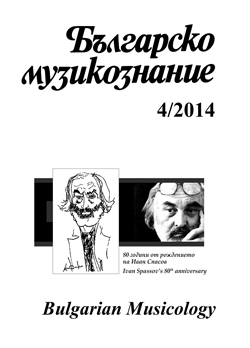Пасионът по Лука от Кшищоф Пендерецки като Weltanschauungsmusik (Част II: Богословски и херменевтични основания в композицията на текста)
St Luke Passion by Krzysztof Penderecki as Weltanschauungsmusik (Part II: Theological and hermeneutical foundations in the composition of the...
Author(s): Iliya GramatikoffSubject(s): Music
Published by: Институт за изследване на изкуствата, Българска академия на науките
Keywords: Penderecki; passion; Weltanschauungsmusik (music expressive of a philosophy of life); liturgicality; theological exegesis.
Summary/Abstract: St Luke Passion by Krzysztof Penderecki as Weltanschauungsmusik (Part II: Theological and hermeneutical foundations in the composition of the libretto) The present article forms the second part of a study of St Luke Passion (Passio et mors Domini nostri Jesu Christi secun- dum Lucam, 1966) by Krzysztof Penderecki. The article’s analytical focus is on the theological and hermeneutical foundations of the work in an attempt to fully unfold its meaning with regard to the ecclesiastical genesis of the genre and Christian music tradition. Following a detailed analysis of the libretto and the compositional strategy employed in its compilation, the thesis of the inherently liturgical nature of the work can be brought forth; a nature acquired through the biblical and liturgical texts selected for the libretto. This specific ‘divine service’ modus and the ecclesiastical nature of the work are defined by the author of the study using the term ‘immanent liturgical ethos’. An important highlight of the article deals with the Christocentric Oldtestamentical perspective, which lies at the core of the composer’s musical interpretation of the Passion of Jesus. It is revealed by the inclusion in the libretto of fragments of the Old Testament as pre-figuring types of passion events transmitted in the testimony of Luke. Through this exegetical method of theological typology Penderecki gives to his passion a messianic Christological horizon. The analysis of the dramaturgical plan of the work reveals hermeneutic aspects which are central to its understanding, yielded by the composer’s active immersion in church tradition. Thus the composer manages to announce his own artistic interpretation of the Passion in tune with contemporary hermeneutic trends in Biblical exegesis and the theological doctrine of the four- fold sense of the Holy Scripture. Through his musical reading of the Passion, Penderecki tries to understand the cruelty and tragedy of his time. He looks for a way to solve the pressing problems of modern times by offering his artistic concept of the salvation of modern man in the light of Christianity. In this aspect, the work is interpreted by the author of the article as Weltanschauungsmusik, music, revealing the artistic outlook of the composer, founded in church tradition and pro- claiming the intransience of the Christian worldview as an ideal valid also for modern times.
Journal: Българско музикознание
- Issue Year: 2014
- Issue No: 4
- Page Range: 72-99
- Page Count: 28
- Content File-PDF

